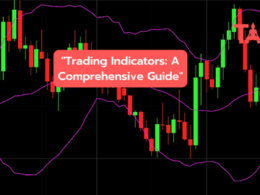Trading can be challenging, especially for beginners who lack experience and knowledge. It requires discipline, focus, and the ability to manage emotions effectively. However, anyone can become a successful trader with the right mindset and habits. This article will discuss five trading habits that will improve your results and help you achieve your financial goals.
Table of Contents
1. Habit #1: Set Clear Goals
2. Habit #2: Keep a Trading Journal
3. Habit #3: Follow a Trading Plan
4. Habit #4: Control Your Emotions
5. Habit #5: Practice Proper Risk Management
Habit #1: Set Clear Goals

One of the essential habits for successful trading is setting clear and realistic goals. Without a clear sense of direction, traders are likely to make emotional decisions based on short-term fluctuations in the market. To avoid this, you should define your financial objectives and create a plan to achieve them. This can involve setting targets for profits and losses and establishing a timeframe for your trades.
Habit #2: Keep a Trading Journal

Keeping a trading journal is a powerful habit that can improve your trading skills and results. It allows you to track your progress, analyze your performance, and identify areas for improvement. In your journal, you should record your trades, including the entry and exit points, the reason for the trade, and any emotions you experienced. Reviewing your journal regularly allows you to learn from your mistakes and refine your strategy.
Habit #3: Follow a Trading Plan

A trading plan is a collection of rules that govern your trading decisions. It should include your goals, risk tolerance, and strategy for entering and exiting trades. By following a trading plan, you can avoid impulsive decisions and stick to a disciplined approach. This can help you to stay focused on your long-term goals and avoid the emotional ups and downs of the market.
Habit #4: Control Your Emotions

Emotions can significantly impact trading decisions, leading to irrational behavior and poor results. To be a successful trader, you must learn to control your emotions and stay focused on your strategy. This can involve meditation, deep breathing, and positive visualization. By maintaining a calm and rational mindset, you can make better-informed decisions and avoid costly mistakes.
Habit #5: Practice Proper Risk Management

Risk management is an essential aspect of trading that involves managing your exposure to potential losses. This can involve setting stop-loss orders, diversifying your portfolio, and using leverage responsibly. Practicing proper risk management can protect your capital and avoid catastrophic losses. This can also help you to maintain a long-term perspective and avoid the temptation to chase short-term gains.
Conclusion
In conclusion, trading is a challenging but rewarding activity that requires discipline, focus, and proper habits. By setting clear goals, keeping a trading journal, following a trading plan, controlling your emotions, and practicing proper risk management, you can improve your results and achieve your financial objectives. Remember, success in trading requires patience, persistence, and a commitment to continuous improvement.
FAQs
1. How can I set realistic trading goals?
To set realistic trading goals, evaluate your skills and experience, assess your risk tolerance, identify your financial goals, and set specific, measurable, achievable, relevant, and time-bound (SMART) goals that adjust with your strategy and regularly review and adjust them based on performance and market conditions.
2. What should I include in my trading journal?
A trading journal should include the date and time of the trade, the instrument traded, entry and exit prices, trade rationale, outcome, market conditions, emotions/thoughts, and lessons learned.
3. How do I create a trading plan?
To create a trading plan, you should define your goals and risk tolerance, select a trading style and strategy, determine your position sizing and risk management rules, and establish entry and exit criteria based on technical and/or fundamental analysis. Regularly reviewing and updating your trading plan can support you stay disciplined and consistent in your trading approach.
4. What are some techniques for controlling emotions during trading?
Some techniques for controlling emotions during trading include setting clear trading goals, establishing a trading plan, using stop-loss orders, avoiding impulsive trades, taking breaks when feeling stressed or overwhelmed, and practicing mindfulness and self-awareness. Additionally, keeping a trading journal to record and reflect on emotions and thought processes can help improve emotional regulation over time.
5. Why is risk management essential for trading success?
Risk management is essential for trading success because it helps traders limit potential losses, preserve capital, and maintain consistency in their trading approach. By implementing risk management strategies such as position sizing, stop-loss orders, and diversification, traders can minimize the impact of individual losing trades and reduce the risk of a catastrophic loss. This can ultimately help improve long-term trading profitability and success.










